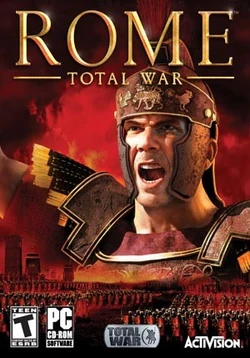
Rome: Total War (often abbreviated to RTW or Rome) is a critically acclaimed[1] strategy game composed of both turn-based strategy and real-time tactics, in which the player fights historical and fictitious battles set during late Roman Republic and early Roman Empire (270 BC–AD 14). The game was developed by The Creative Assembly and released on September 22, 2004.[2] It is the third game of The Creative Assembly's Total War series.
Gameplay
The player takes a role equivalent to the head of one the three great Roman houses at the time; the Julius (known as the Julii) , the Scipio (known as the "Scipii" in the game) or the Brutus (called the "Brutii"). Each of these factions has a different set of attributes and initial objectives. After a winning campaign as Romans (or using a simple mod) it is possible to play with other factions and take on a role similar to that of Hannibal, Commander-in-chief of the Carthaginian armies during the Second Punic War or the Gallic warlord Vercingetorix.
Gameplay
Battles in Rome: Total War can feature thousands of individual units.
Gameplay consists of a combination of turn-based strategy and 3D real-time tactical battles. The 3D real-time action is uniquely different from most standard RTS games in that tactical maneuvering is critical to success whereas most RTS games take no account for the direction units are facing, flanking movements, breaking of lines, etc. The high-quality 3D graphics engine is able to render over thirty thousand men on a single battlefield. The strategic and tactical modes integrate such that the landscape for the battles is the same as seen on that particular spot on the strategic map where the armies meet.
The game is similar to its predecessors, Shogun: Total War and Medieval: Total War, although there are some changes to the mechanics of sieges and city fights have been added. Most notable is that players now move their units with movement points; in previous games units were moved by territory.
Armies can be built to conquer nearby provinces; to conquer a province, you must capture its settlement. Fleets at sea can also ferry troops, and blockade enemy ports, thus cutting down income from trade. While doing so, players can build certain buildings within their cities to move up through the tech tree to train more advanced units, increase a province's income, and/or keep the population happy. The ultimate goal, as in previous Total War games, is to conquer 50 provinces and capture Rome, thereby becoming Emperor.
Factions
In Rome: Total War, the player takes control of a historical faction of the era. Here is a complete list of all the Playable and Non-Playable Factions.
African Factions
Barbarian Factions
- Britannia (Playable)
- Dacia (Non-Playable)
- Gaul (Playable)
- Germania (Playable)
- Spain (Non-Playable)
- Scythians (Non-Playable)
Eastern Factions
- Armenia (Non-Playable)
- Parthia (Playable)
Egyptian Factions
- Egypt (Playable)
Greek Factions
- Greek Cities (Playable)
- Macedon (Non-Playable)
- Seleucid Empire (Playable)
- Pontus (Non-Playable)
- Thrace (Non-Playable)
Roman Famillies
- House of Brutii (Brutus) (Playable)
- House of Julii (Julius) (Playable)
- House of Scipii (Scipio) (Playable)
- SPQR (Non-playable)
Family
Each faction starts with a set of family members composed of that faction's leader, his spouse, their children, including a faction heir, any of their spouses, and any grandchildren. Only the male members of the family are controllable, and these only once they are 16, at which point they reach adulthood and become "full" family members. They govern provinces when stationed in a city, and when fielded upon the world map command armies in the field. Male family members are added to the family by births between married family members, as well as adoption and marriage. Family members eventually die, either naturally through old age or by death in battle, assassination, or natural disasters.
In the absence of generals commanding field armies, captains are the commanders by default. Admirals fulfil a similar function for fleets. Neither are family members, but appear in the list of forces when displayed. However, if a Captain is victorious in a battle in which the odds are against him (Heroic Victory), the player may have the option of welcoming the Captain to the family.
Family members can acquire traits depending on their actions in battle or when governing a city. These can have both positive and negative effects on their command, management, and influence, which in turn affect their battlefield performance and how well a province they govern operates. Some of these traits are hereditary, and can be inherited by the children of a family member. Family members can also acquire ancillaries by the same actions. These are members of a general's retinue, but can only number up to eight. These ancillary characters can be traded between two family members if they are in the same army or city.
Agents
There are three types of agents that can be used by factions: spies, diplomats, and assassins. Like family members, agents can acquire traits and specific ancillaries, which can be traded, but only with other agents of the same type. They can independently cross into other territories (allied, neutral or hostile) without triggering a transgression message that happens when an army attempts to do the same. They can also be attached to an army, at which point they travel with them until detached to operate independently. Spies can be used to gather intelligence on field armies, infiltrate foreign cities and serve in a counter-espionage role in the players own cities. All missions carry a risk to the spy. Diplomats can negotiate with other factions, offering deals such as alliances and trade rights. They may also attempt to bribe enemy armies and agents. Assassins are used in Rome: Total War to assassinate enemy characters, as well as sabotaging buildings in enemy settlements. These missions carry a risk of death towards the agent.
Mercenaries
On the campaign map, generals can hire mercenaries for an amount of denari when there are mercenaries available in a territory, which are already trained and can be put to immediate use. Mercenaries vary depending on where they are recruited from, often being accustomed to the local terrain and tactics. There are disadvantages of using mercenaries; including high recruitment costs and mercenaries take part of the looting from a settlement instead of going to the player.
Unlike other units, when mercenaries are retrained their equipment is upgraded, but their casualties are not replaced. They also have a lower morale than many of the other soldiers that are recruitable
History
A demo of the game was released on August 23, 2004 and is freely available for downloading. It features a playable version of the Battle of the Trebia, with the player taking the role of Hannibal.
Prior to its release, a preliminary but completely workable version of the game engine was used in two series of TV programs: Decisive Battles by the History Channel where it was used to recreate famous historical battles,[3] and Time Commanders by BBC Two, where teams of novice non-gamers commanded ancient armies to replay key battles of antiquity. The game engine was fine-tuned specifically for these television shows by military historians for maximum historical accuracy.
The original music soundtrack for the game was composed by Jeff van Dyck, who received a BAFTA (British Academy) Interactive Awards nomination for his work. His wife Angela van Dyck features in some of the vocals; Angela also wrote the lyrics for the song "Divinitus", the lyrics of which are in Latin. The game's most notable collaboration between Jeff and Angela is "Forever", which plays while the game's credits are rolling. "Forever" was originally meant to be the game's main menu song.
Reviews and awards
Rome: Total War has been critically acclaimed by many reviewers and is generally regarded as one of the best strategy games of 2004, winning numerous awards and high scores from gaming websites and magazines alike. The review aggregator Game Rankings shows an average of 91.7% from 65 major critic reviews, with 48 reviews in the 90%s.[4]
- PC Gamer (UK): All time 5th best PC game "95%"
- IGN: Editor's Choice Award, 4th Best PC Game of all Time.[5]
- PC Gamer (US): Editor's Choice, Best Strategy Game of 2004
- GameSpot: Editor's Choice, Strategy Game of 2004
- Adrenaline Vault: Seal of Excellence
- GameSpy: Editor's Choice
- E3 2003 Game Critics Awards: Best Strategy Game
- X-Play: 5 out of 5
- PC Powerplay: 95%
Expansions
Rome Total War: Barbarian Invasion
Main article: Rome: Total War: Barbarian Invasion
Barbarian Invasion was the first expansion pack for Rome: Total War. It was released on September 27, 2005. It allowed the player to take part in the fall of the Roman Empire and the events which came after it. There were also a good deal of new features added in the game such as generals' loyalty, religion, hordes and the "Sack" option for conquered cities. It was also commended for the fact that it did not have any unlockable factions; all the playable factions were available from the start. Other enhancements included improved AI.
Rome: Total War: Alexander
Main article: Rome: Total War: Alexander
The Alexander expansion puts the player in the role of Alexander the Great and replays his conquests and battles.
Trivias
- A tv serie called Time Commanders aired on BBC Two featured people recreating famous historical battles using a modified version of Rome: Total War. The show ran for 2 seasons from 2003 to 2005.
External links
- ↑ The Creative Assembly
- ↑ The Creative Assembly
- ↑ John Gaudiosi, "Rome: First a Game, Now on TV," Wired (05.17.04).
- ↑ Rome: Total War Reviews, Game Rankings. Retrieved on 2008-08-20.
- ↑ Template:Citation/core
